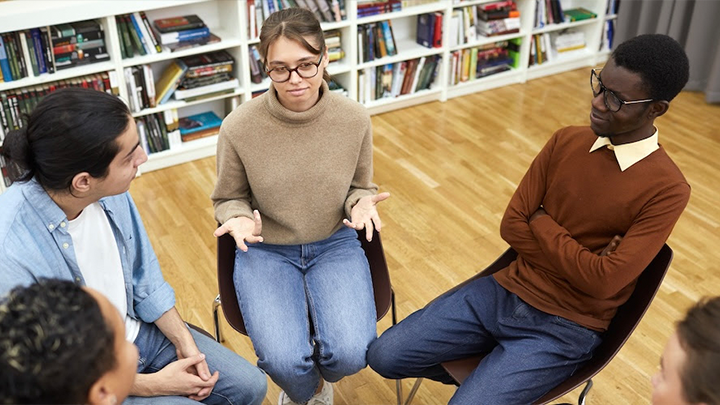Amid a high-stakes election, mental health practitioners-in-training to offer emotional support to students
College of Education and Presidential Global Democracy Fund launch post-election Student Listening Sessions led by mental health practitioners-in-training.

Future mental health practitioners studying at San Diego State University are lending a trained ear to students amid an election cycle marked by stress and uncertainty.
The SDSU College of Education has received funding from the inaugural Presidential Global Democracy Fund to provide Student Listening Sessions for all SDSU students starting Wednesday and through Nov. 15.
The sessions are not meant to be discussions of political ideology. Instead, they are designed to offer students a supportive space to share their thoughts and feelings at an uncertain time.
"As the contentious presidential race unfolded, it became clear to me that our college is in a unique position to support the emotional well-being of the entire SDSU student body," said Y. Barry Chung, Dean of the College of Education. "We have graduate students in our Departments of Counseling and School Psychology and Child and Family Development who have both excellent clinical training and a sincere desire to support those in distress.
“I am so proud of the way these students have responded to the call."
More than 30 students signed up to serve as co-facilitators. The Presidential Global Democracy Fund, an SDSU initiative to foster meaningful dialogue on pressing global and national issues, has provided funding to compensate those selected.
“The Presidential Global Democracy Fund is dedicated to building and nurturing a campus climate and community that welcomes and provides safe spaces for diverse experiences and viewpoints at this critical time in our national dialogue,” said Presidential Global Democracy Fund Chair Mary Taylor, SDSU's Associate Chief Diversity Officer for Outreach and Success.
“These postelection emotional support sessions provided by the SDSU College of Education are a shining example of the ways in which we can engage in listening and dialogue that promote understanding, respect and growth.”
Signs of distress
It's normal to become swept up in the news, particularly during times of uncertainty. But Professor Samuel Song, associate dean for Diversity, Equity and Inclusion in the College of Education, said there are warning signs when a person is becoming overly preoccupied.
"At times like this, it's harder to say how much is too much — it's very individual and obviously people will be affected differently," said Song, an expert in school psychology who has been working with his colleagues to organize the Student Listening Sessions. "But being preoccupied to the point of disrupting your regular routine is a good example of someone who might need some support."
Other possible warning signs, he said, include an inability to sleep, changes in eating habits, depressed mood, aggression, self-imposed isolation, physiological symptoms like breathlessness or pressure in the chest, an inability to stop thinking about the election or turning to alcohol or other controlled substances to cope.
Song added that talking in community with others can be a powerful way to help individuals cope during this time and move forward.
"You want to be able to express your feelings, concerns and thoughts, and have them received by other people,” Song said. “People need validation and to know they're not alone. This process can actually help you understand what's going on better within yourself, and in the world as well."
Session details
Student Listening Sessions will be held Wednesday through Friday of election week, and Nov. 12-15. Multiple in-person time slots are available and Zoom sessions are open to those who cannot make it to the Montezuma Mesa campus.
Each session will be co-facilitated by two mental health practitioners-in-training in a space capable of accommodating approximately 15 students. Faculty will not be present, though they are taking an active role in training and supporting the co-facilitators.
All attendees should keep session discussions private. Confidentiality will be maintained, except when session leads must report potential or actual threats of harm.
RSVP today to participate in a Student Listening Session.



